EWS 240-903: Endorsements and Social Awareness by Media Celebrities
VerifiedAdded on 2023/03/21
|8
|2068
|61
Essay
AI Summary
This essay examines the positive impact of social media influencers on society, focusing on their role in product endorsements, informing the public about new products and events, and raising awareness about social causes. It discusses how celebrities have evolved into trendsetters and social media influencers, impacting consumer choices and preferences. The essay highlights the shift from traditional media to social media, with Gen Z relying heavily on social media for product information. It also addresses the importance of authenticity and credibility in celebrity endorsements, noting the potential negative impacts of inauthentic endorsements. The essay concludes that celebrity-endorsed advertisements generate more interest on social media and that a strong connection exists between perception and buying behavior. Desklib provides access to this and similar assignments for students seeking academic resources.
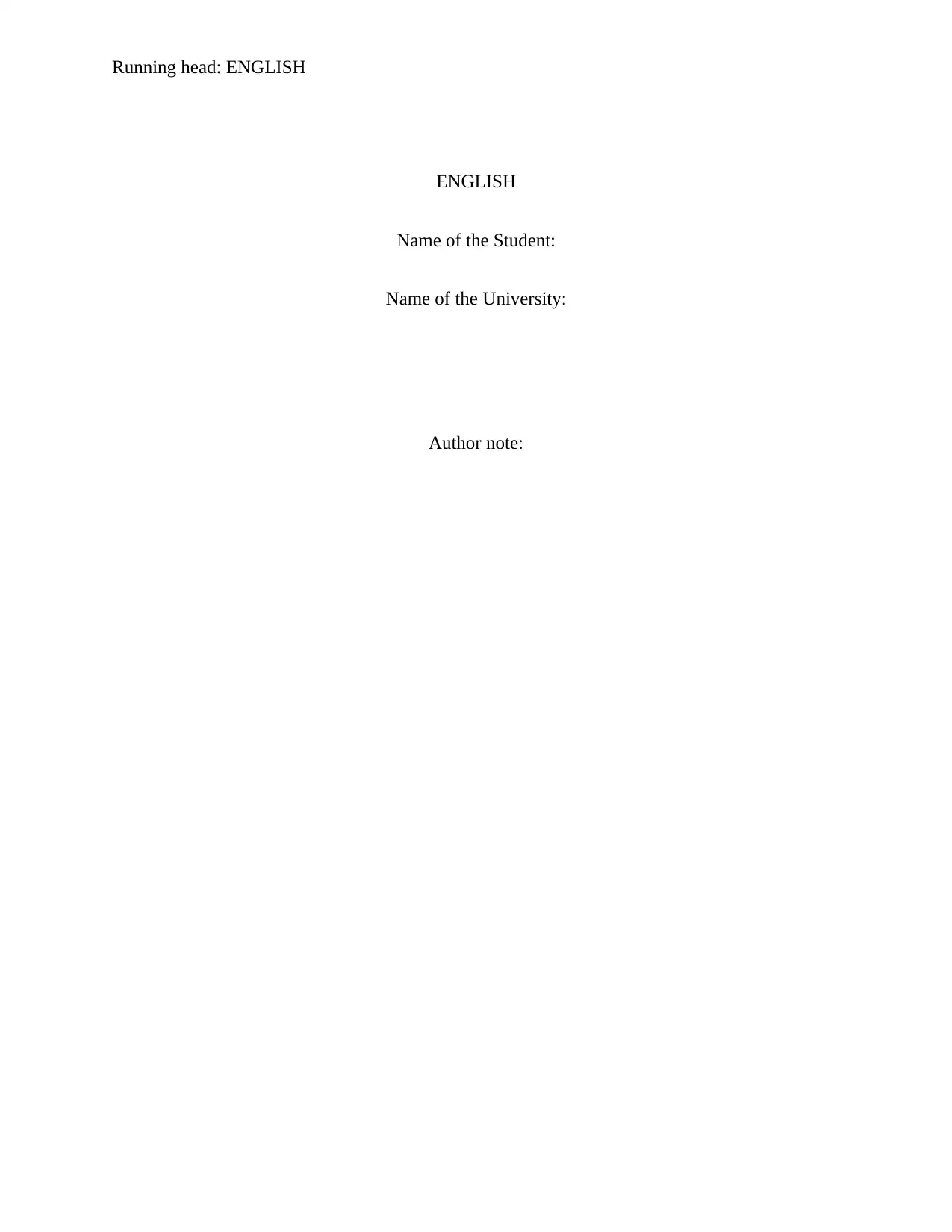
Running head: ENGLISH
ENGLISH
Name of the Student:
Name of the University:
Author note:
ENGLISH
Name of the Student:
Name of the University:
Author note:
Paraphrase This Document
Need a fresh take? Get an instant paraphrase of this document with our AI Paraphraser
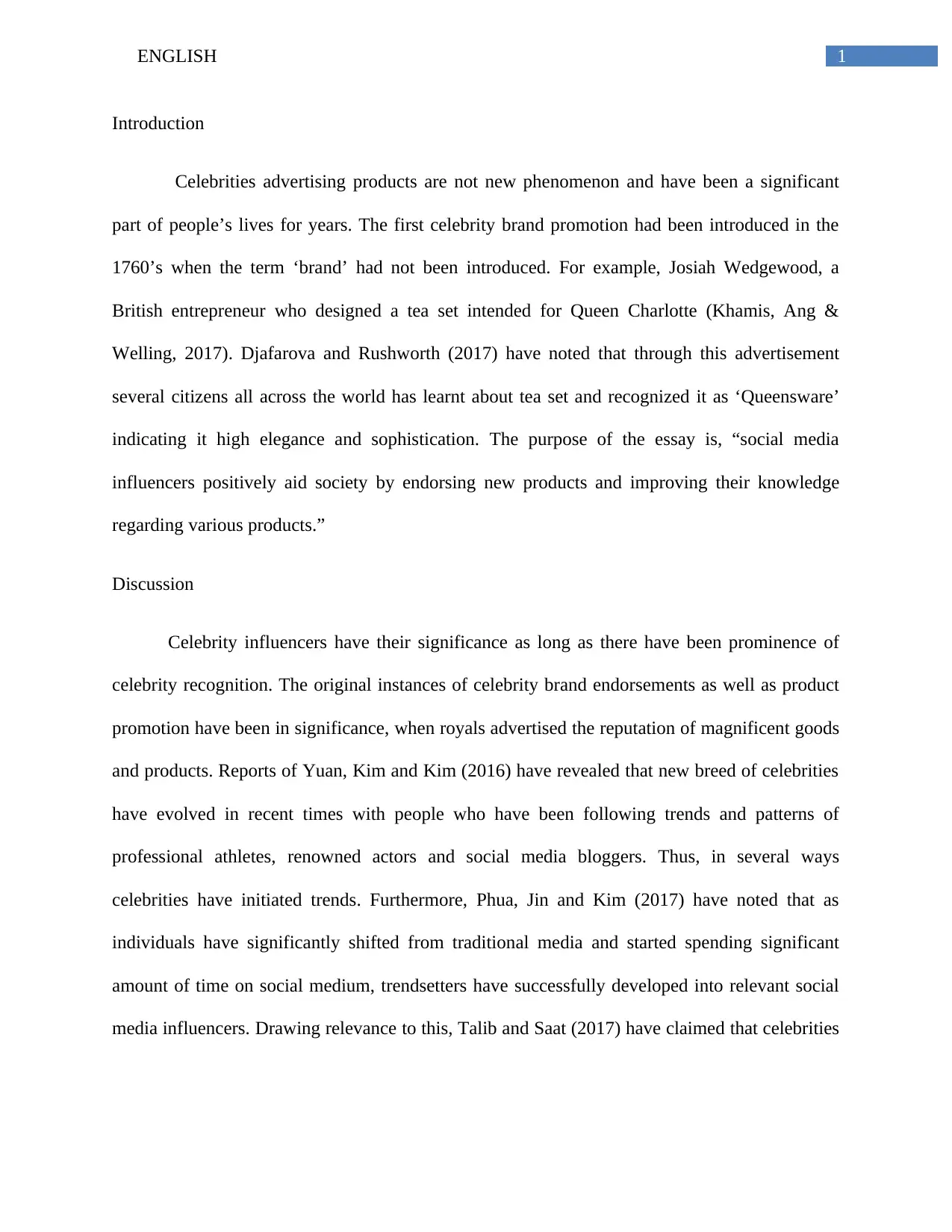
1ENGLISH
Introduction
Celebrities advertising products are not new phenomenon and have been a significant
part of people’s lives for years. The first celebrity brand promotion had been introduced in the
1760’s when the term ‘brand’ had not been introduced. For example, Josiah Wedgewood, a
British entrepreneur who designed a tea set intended for Queen Charlotte (Khamis, Ang &
Welling, 2017). Djafarova and Rushworth (2017) have noted that through this advertisement
several citizens all across the world has learnt about tea set and recognized it as ‘Queensware’
indicating it high elegance and sophistication. The purpose of the essay is, “social media
influencers positively aid society by endorsing new products and improving their knowledge
regarding various products.”
Discussion
Celebrity influencers have their significance as long as there have been prominence of
celebrity recognition. The original instances of celebrity brand endorsements as well as product
promotion have been in significance, when royals advertised the reputation of magnificent goods
and products. Reports of Yuan, Kim and Kim (2016) have revealed that new breed of celebrities
have evolved in recent times with people who have been following trends and patterns of
professional athletes, renowned actors and social media bloggers. Thus, in several ways
celebrities have initiated trends. Furthermore, Phua, Jin and Kim (2017) have noted that as
individuals have significantly shifted from traditional media and started spending significant
amount of time on social medium, trendsetters have successfully developed into relevant social
media influencers. Drawing relevance to this, Talib and Saat (2017) have claimed that celebrities
Introduction
Celebrities advertising products are not new phenomenon and have been a significant
part of people’s lives for years. The first celebrity brand promotion had been introduced in the
1760’s when the term ‘brand’ had not been introduced. For example, Josiah Wedgewood, a
British entrepreneur who designed a tea set intended for Queen Charlotte (Khamis, Ang &
Welling, 2017). Djafarova and Rushworth (2017) have noted that through this advertisement
several citizens all across the world has learnt about tea set and recognized it as ‘Queensware’
indicating it high elegance and sophistication. The purpose of the essay is, “social media
influencers positively aid society by endorsing new products and improving their knowledge
regarding various products.”
Discussion
Celebrity influencers have their significance as long as there have been prominence of
celebrity recognition. The original instances of celebrity brand endorsements as well as product
promotion have been in significance, when royals advertised the reputation of magnificent goods
and products. Reports of Yuan, Kim and Kim (2016) have revealed that new breed of celebrities
have evolved in recent times with people who have been following trends and patterns of
professional athletes, renowned actors and social media bloggers. Thus, in several ways
celebrities have initiated trends. Furthermore, Phua, Jin and Kim (2017) have noted that as
individuals have significantly shifted from traditional media and started spending significant
amount of time on social medium, trendsetters have successfully developed into relevant social
media influencers. Drawing relevance to this, Talib and Saat (2017) have claimed that celebrities
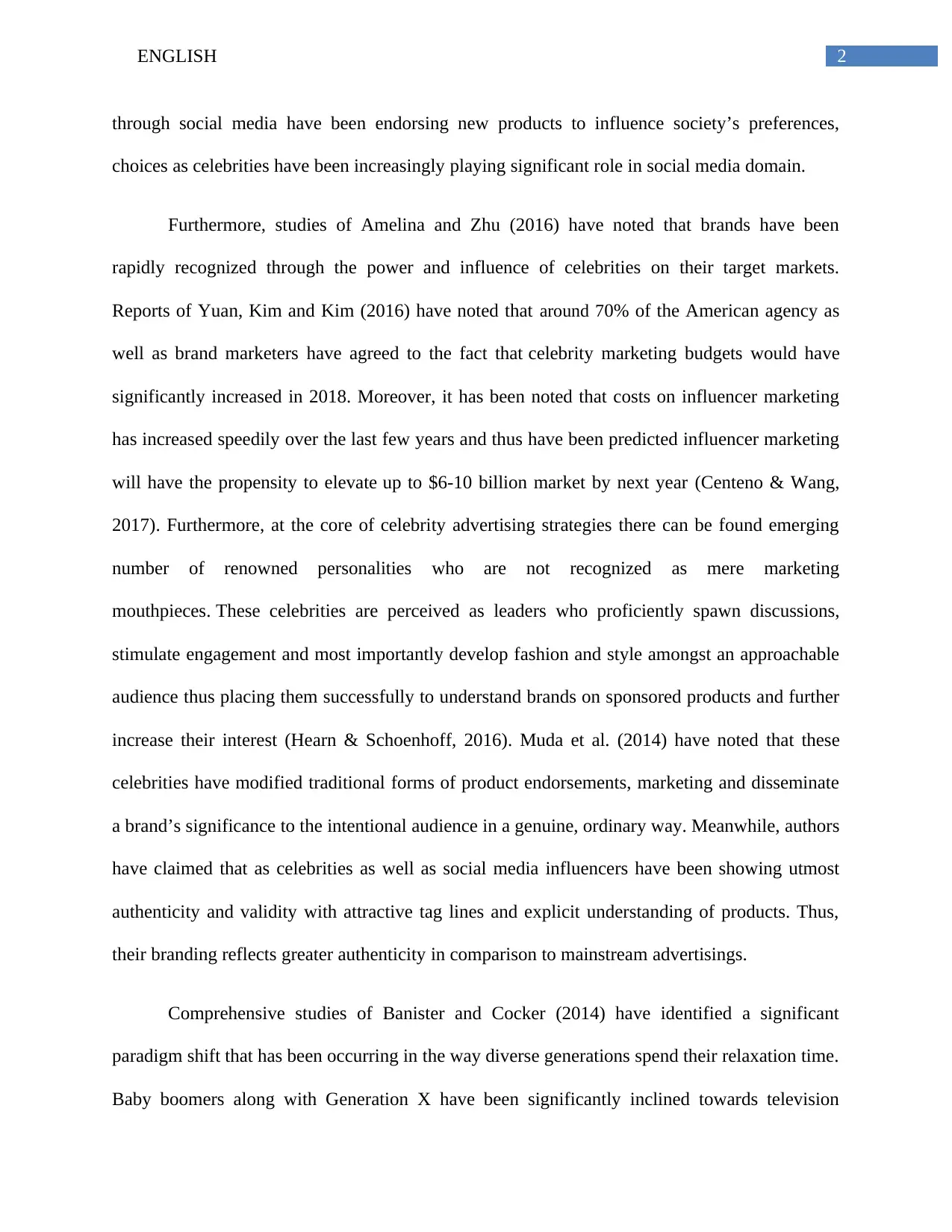
2ENGLISH
through social media have been endorsing new products to influence society’s preferences,
choices as celebrities have been increasingly playing significant role in social media domain.
Furthermore, studies of Amelina and Zhu (2016) have noted that brands have been
rapidly recognized through the power and influence of celebrities on their target markets.
Reports of Yuan, Kim and Kim (2016) have noted that around 70% of the American agency as
well as brand marketers have agreed to the fact that celebrity marketing budgets would have
significantly increased in 2018. Moreover, it has been noted that costs on influencer marketing
has increased speedily over the last few years and thus have been predicted influencer marketing
will have the propensity to elevate up to $6-10 billion market by next year (Centeno & Wang,
2017). Furthermore, at the core of celebrity advertising strategies there can be found emerging
number of renowned personalities who are not recognized as mere marketing
mouthpieces. These celebrities are perceived as leaders who proficiently spawn discussions,
stimulate engagement and most importantly develop fashion and style amongst an approachable
audience thus placing them successfully to understand brands on sponsored products and further
increase their interest (Hearn & Schoenhoff, 2016). Muda et al. (2014) have noted that these
celebrities have modified traditional forms of product endorsements, marketing and disseminate
a brand’s significance to the intentional audience in a genuine, ordinary way. Meanwhile, authors
have claimed that as celebrities as well as social media influencers have been showing utmost
authenticity and validity with attractive tag lines and explicit understanding of products. Thus,
their branding reflects greater authenticity in comparison to mainstream advertisings.
Comprehensive studies of Banister and Cocker (2014) have identified a significant
paradigm shift that has been occurring in the way diverse generations spend their relaxation time.
Baby boomers along with Generation X have been significantly inclined towards television
through social media have been endorsing new products to influence society’s preferences,
choices as celebrities have been increasingly playing significant role in social media domain.
Furthermore, studies of Amelina and Zhu (2016) have noted that brands have been
rapidly recognized through the power and influence of celebrities on their target markets.
Reports of Yuan, Kim and Kim (2016) have noted that around 70% of the American agency as
well as brand marketers have agreed to the fact that celebrity marketing budgets would have
significantly increased in 2018. Moreover, it has been noted that costs on influencer marketing
has increased speedily over the last few years and thus have been predicted influencer marketing
will have the propensity to elevate up to $6-10 billion market by next year (Centeno & Wang,
2017). Furthermore, at the core of celebrity advertising strategies there can be found emerging
number of renowned personalities who are not recognized as mere marketing
mouthpieces. These celebrities are perceived as leaders who proficiently spawn discussions,
stimulate engagement and most importantly develop fashion and style amongst an approachable
audience thus placing them successfully to understand brands on sponsored products and further
increase their interest (Hearn & Schoenhoff, 2016). Muda et al. (2014) have noted that these
celebrities have modified traditional forms of product endorsements, marketing and disseminate
a brand’s significance to the intentional audience in a genuine, ordinary way. Meanwhile, authors
have claimed that as celebrities as well as social media influencers have been showing utmost
authenticity and validity with attractive tag lines and explicit understanding of products. Thus,
their branding reflects greater authenticity in comparison to mainstream advertisings.
Comprehensive studies of Banister and Cocker (2014) have identified a significant
paradigm shift that has been occurring in the way diverse generations spend their relaxation time.
Baby boomers along with Generation X have been significantly inclined towards television
⊘ This is a preview!⊘
Do you want full access?
Subscribe today to unlock all pages.

Trusted by 1+ million students worldwide
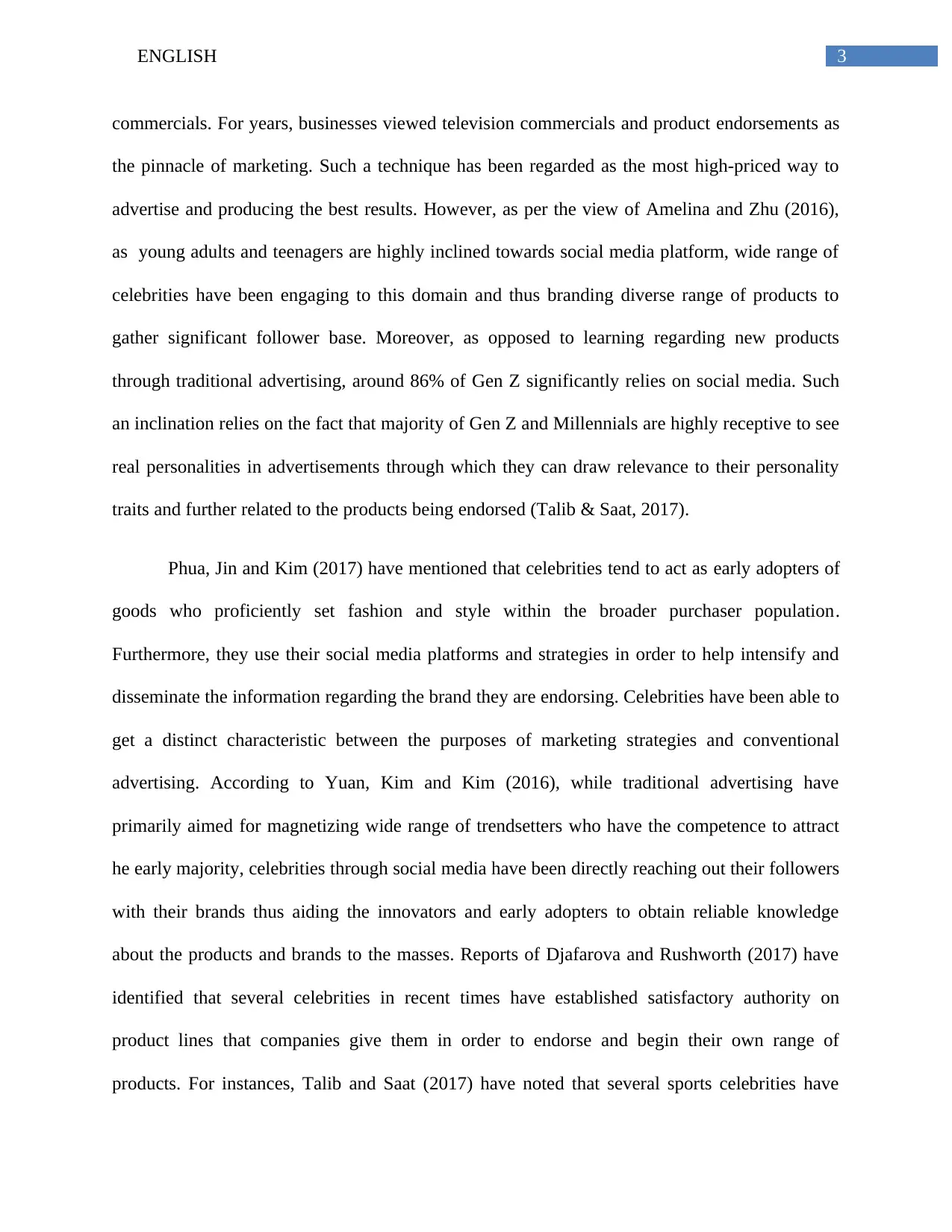
3ENGLISH
commercials. For years, businesses viewed television commercials and product endorsements as
the pinnacle of marketing. Such a technique has been regarded as the most high-priced way to
advertise and producing the best results. However, as per the view of Amelina and Zhu (2016),
as young adults and teenagers are highly inclined towards social media platform, wide range of
celebrities have been engaging to this domain and thus branding diverse range of products to
gather significant follower base. Moreover, as opposed to learning regarding new products
through traditional advertising, around 86% of Gen Z significantly relies on social media. Such
an inclination relies on the fact that majority of Gen Z and Millennials are highly receptive to see
real personalities in advertisements through which they can draw relevance to their personality
traits and further related to the products being endorsed (Talib & Saat, 2017).
Phua, Jin and Kim (2017) have mentioned that celebrities tend to act as early adopters of
goods who proficiently set fashion and style within the broader purchaser population.
Furthermore, they use their social media platforms and strategies in order to help intensify and
disseminate the information regarding the brand they are endorsing. Celebrities have been able to
get a distinct characteristic between the purposes of marketing strategies and conventional
advertising. According to Yuan, Kim and Kim (2016), while traditional advertising have
primarily aimed for magnetizing wide range of trendsetters who have the competence to attract
he early majority, celebrities through social media have been directly reaching out their followers
with their brands thus aiding the innovators and early adopters to obtain reliable knowledge
about the products and brands to the masses. Reports of Djafarova and Rushworth (2017) have
identified that several celebrities in recent times have established satisfactory authority on
product lines that companies give them in order to endorse and begin their own range of
products. For instances, Talib and Saat (2017) have noted that several sports celebrities have
commercials. For years, businesses viewed television commercials and product endorsements as
the pinnacle of marketing. Such a technique has been regarded as the most high-priced way to
advertise and producing the best results. However, as per the view of Amelina and Zhu (2016),
as young adults and teenagers are highly inclined towards social media platform, wide range of
celebrities have been engaging to this domain and thus branding diverse range of products to
gather significant follower base. Moreover, as opposed to learning regarding new products
through traditional advertising, around 86% of Gen Z significantly relies on social media. Such
an inclination relies on the fact that majority of Gen Z and Millennials are highly receptive to see
real personalities in advertisements through which they can draw relevance to their personality
traits and further related to the products being endorsed (Talib & Saat, 2017).
Phua, Jin and Kim (2017) have mentioned that celebrities tend to act as early adopters of
goods who proficiently set fashion and style within the broader purchaser population.
Furthermore, they use their social media platforms and strategies in order to help intensify and
disseminate the information regarding the brand they are endorsing. Celebrities have been able to
get a distinct characteristic between the purposes of marketing strategies and conventional
advertising. According to Yuan, Kim and Kim (2016), while traditional advertising have
primarily aimed for magnetizing wide range of trendsetters who have the competence to attract
he early majority, celebrities through social media have been directly reaching out their followers
with their brands thus aiding the innovators and early adopters to obtain reliable knowledge
about the products and brands to the masses. Reports of Djafarova and Rushworth (2017) have
identified that several celebrities in recent times have established satisfactory authority on
product lines that companies give them in order to endorse and begin their own range of
products. For instances, Talib and Saat (2017) have noted that several sports celebrities have
Paraphrase This Document
Need a fresh take? Get an instant paraphrase of this document with our AI Paraphraser
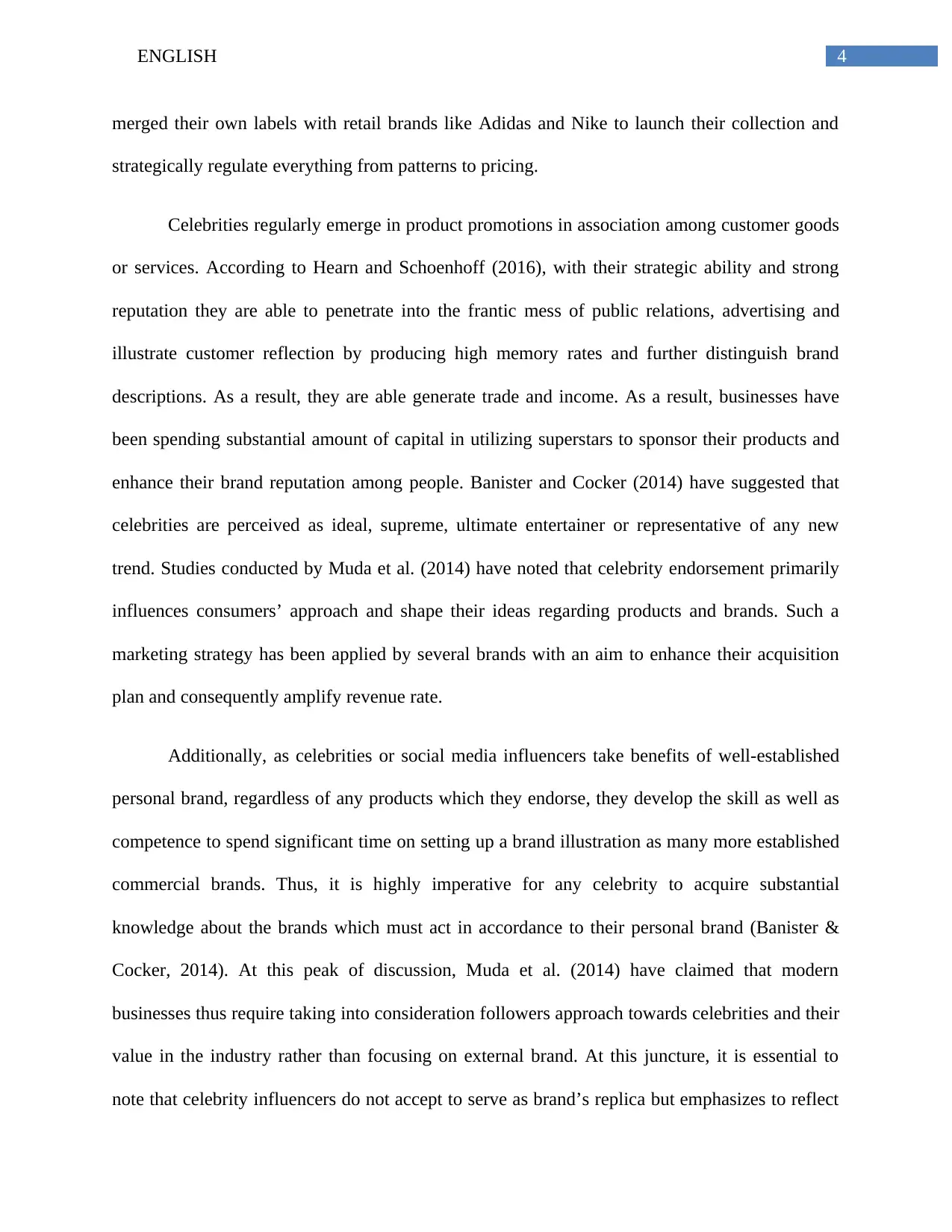
4ENGLISH
merged their own labels with retail brands like Adidas and Nike to launch their collection and
strategically regulate everything from patterns to pricing.
Celebrities regularly emerge in product promotions in association among customer goods
or services. According to Hearn and Schoenhoff (2016), with their strategic ability and strong
reputation they are able to penetrate into the frantic mess of public relations, advertising and
illustrate customer reflection by producing high memory rates and further distinguish brand
descriptions. As a result, they are able generate trade and income. As a result, businesses have
been spending substantial amount of capital in utilizing superstars to sponsor their products and
enhance their brand reputation among people. Banister and Cocker (2014) have suggested that
celebrities are perceived as ideal, supreme, ultimate entertainer or representative of any new
trend. Studies conducted by Muda et al. (2014) have noted that celebrity endorsement primarily
influences consumers’ approach and shape their ideas regarding products and brands. Such a
marketing strategy has been applied by several brands with an aim to enhance their acquisition
plan and consequently amplify revenue rate.
Additionally, as celebrities or social media influencers take benefits of well-established
personal brand, regardless of any products which they endorse, they develop the skill as well as
competence to spend significant time on setting up a brand illustration as many more established
commercial brands. Thus, it is highly imperative for any celebrity to acquire substantial
knowledge about the brands which must act in accordance to their personal brand (Banister &
Cocker, 2014). At this peak of discussion, Muda et al. (2014) have claimed that modern
businesses thus require taking into consideration followers approach towards celebrities and their
value in the industry rather than focusing on external brand. At this juncture, it is essential to
note that celebrity influencers do not accept to serve as brand’s replica but emphasizes to reflect
merged their own labels with retail brands like Adidas and Nike to launch their collection and
strategically regulate everything from patterns to pricing.
Celebrities regularly emerge in product promotions in association among customer goods
or services. According to Hearn and Schoenhoff (2016), with their strategic ability and strong
reputation they are able to penetrate into the frantic mess of public relations, advertising and
illustrate customer reflection by producing high memory rates and further distinguish brand
descriptions. As a result, they are able generate trade and income. As a result, businesses have
been spending substantial amount of capital in utilizing superstars to sponsor their products and
enhance their brand reputation among people. Banister and Cocker (2014) have suggested that
celebrities are perceived as ideal, supreme, ultimate entertainer or representative of any new
trend. Studies conducted by Muda et al. (2014) have noted that celebrity endorsement primarily
influences consumers’ approach and shape their ideas regarding products and brands. Such a
marketing strategy has been applied by several brands with an aim to enhance their acquisition
plan and consequently amplify revenue rate.
Additionally, as celebrities or social media influencers take benefits of well-established
personal brand, regardless of any products which they endorse, they develop the skill as well as
competence to spend significant time on setting up a brand illustration as many more established
commercial brands. Thus, it is highly imperative for any celebrity to acquire substantial
knowledge about the brands which must act in accordance to their personal brand (Banister &
Cocker, 2014). At this peak of discussion, Muda et al. (2014) have claimed that modern
businesses thus require taking into consideration followers approach towards celebrities and their
value in the industry rather than focusing on external brand. At this juncture, it is essential to
note that celebrity influencers do not accept to serve as brand’s replica but emphasizes to reflect
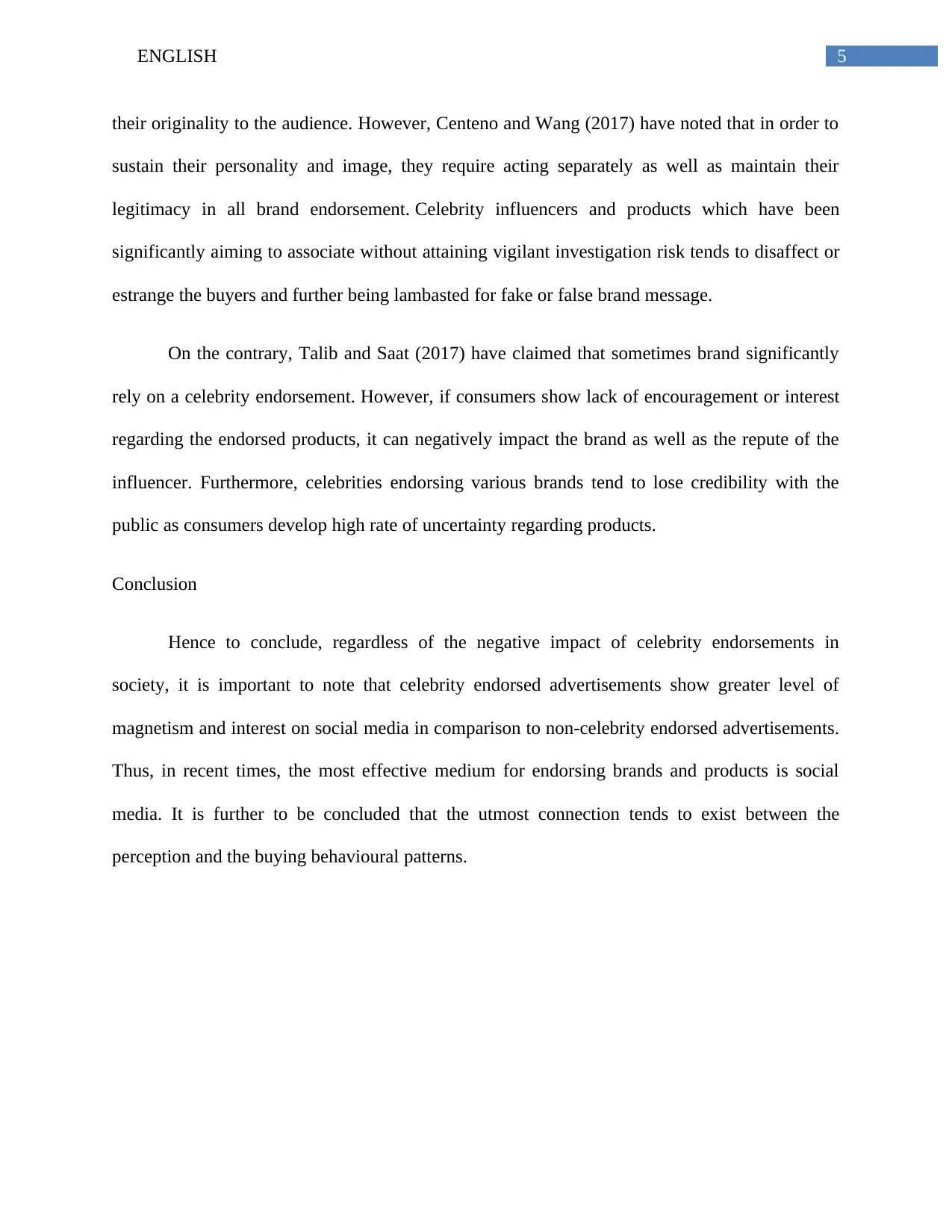
5ENGLISH
their originality to the audience. However, Centeno and Wang (2017) have noted that in order to
sustain their personality and image, they require acting separately as well as maintain their
legitimacy in all brand endorsement. Celebrity influencers and products which have been
significantly aiming to associate without attaining vigilant investigation risk tends to disaffect or
estrange the buyers and further being lambasted for fake or false brand message.
On the contrary, Talib and Saat (2017) have claimed that sometimes brand significantly
rely on a celebrity endorsement. However, if consumers show lack of encouragement or interest
regarding the endorsed products, it can negatively impact the brand as well as the repute of the
influencer. Furthermore, celebrities endorsing various brands tend to lose credibility with the
public as consumers develop high rate of uncertainty regarding products.
Conclusion
Hence to conclude, regardless of the negative impact of celebrity endorsements in
society, it is important to note that celebrity endorsed advertisements show greater level of
magnetism and interest on social media in comparison to non-celebrity endorsed advertisements.
Thus, in recent times, the most effective medium for endorsing brands and products is social
media. It is further to be concluded that the utmost connection tends to exist between the
perception and the buying behavioural patterns.
their originality to the audience. However, Centeno and Wang (2017) have noted that in order to
sustain their personality and image, they require acting separately as well as maintain their
legitimacy in all brand endorsement. Celebrity influencers and products which have been
significantly aiming to associate without attaining vigilant investigation risk tends to disaffect or
estrange the buyers and further being lambasted for fake or false brand message.
On the contrary, Talib and Saat (2017) have claimed that sometimes brand significantly
rely on a celebrity endorsement. However, if consumers show lack of encouragement or interest
regarding the endorsed products, it can negatively impact the brand as well as the repute of the
influencer. Furthermore, celebrities endorsing various brands tend to lose credibility with the
public as consumers develop high rate of uncertainty regarding products.
Conclusion
Hence to conclude, regardless of the negative impact of celebrity endorsements in
society, it is important to note that celebrity endorsed advertisements show greater level of
magnetism and interest on social media in comparison to non-celebrity endorsed advertisements.
Thus, in recent times, the most effective medium for endorsing brands and products is social
media. It is further to be concluded that the utmost connection tends to exist between the
perception and the buying behavioural patterns.
⊘ This is a preview!⊘
Do you want full access?
Subscribe today to unlock all pages.

Trusted by 1+ million students worldwide
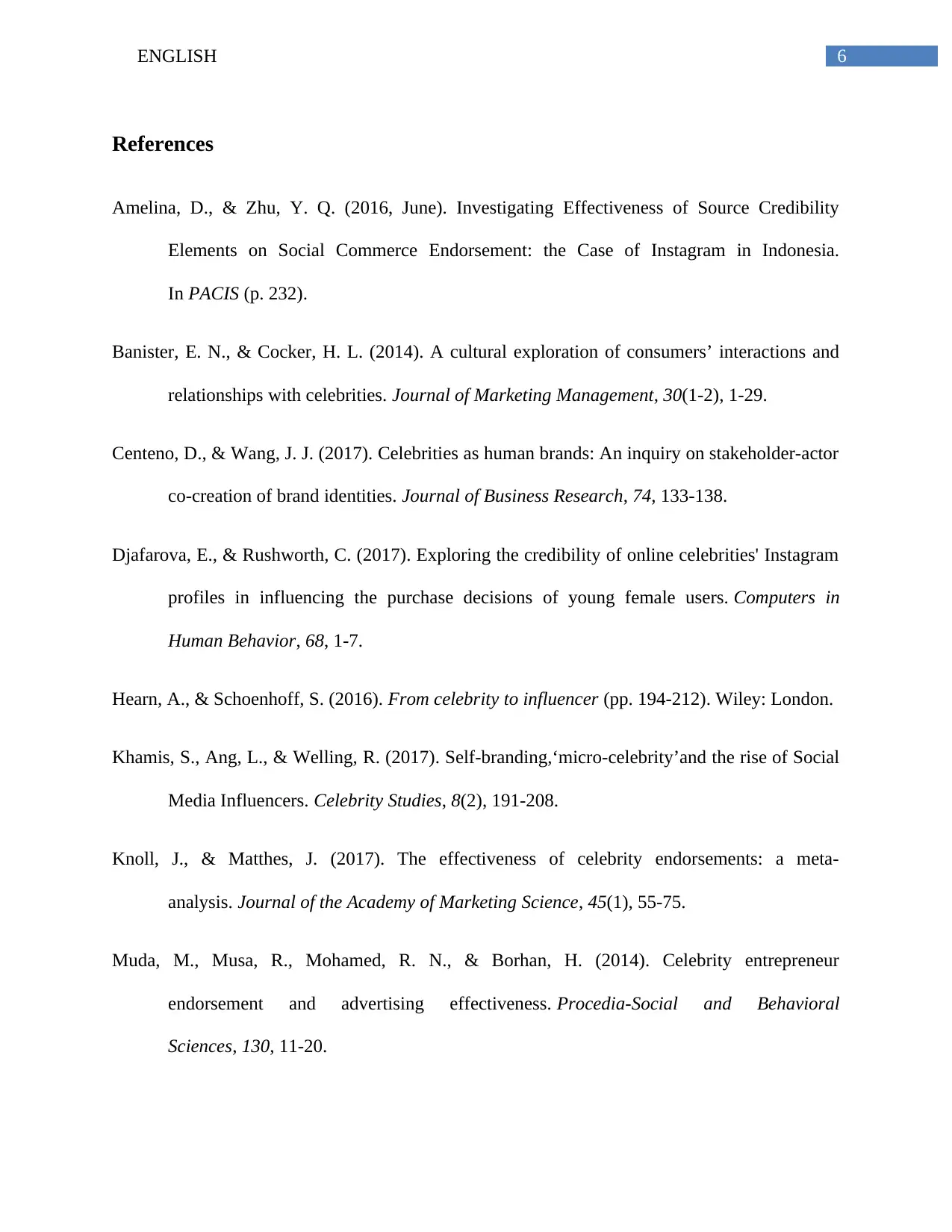
6ENGLISH
References
Amelina, D., & Zhu, Y. Q. (2016, June). Investigating Effectiveness of Source Credibility
Elements on Social Commerce Endorsement: the Case of Instagram in Indonesia.
In PACIS (p. 232).
Banister, E. N., & Cocker, H. L. (2014). A cultural exploration of consumers’ interactions and
relationships with celebrities. Journal of Marketing Management, 30(1-2), 1-29.
Centeno, D., & Wang, J. J. (2017). Celebrities as human brands: An inquiry on stakeholder-actor
co-creation of brand identities. Journal of Business Research, 74, 133-138.
Djafarova, E., & Rushworth, C. (2017). Exploring the credibility of online celebrities' Instagram
profiles in influencing the purchase decisions of young female users. Computers in
Human Behavior, 68, 1-7.
Hearn, A., & Schoenhoff, S. (2016). From celebrity to influencer (pp. 194-212). Wiley: London.
Khamis, S., Ang, L., & Welling, R. (2017). Self-branding,‘micro-celebrity’and the rise of Social
Media Influencers. Celebrity Studies, 8(2), 191-208.
Knoll, J., & Matthes, J. (2017). The effectiveness of celebrity endorsements: a meta-
analysis. Journal of the Academy of Marketing Science, 45(1), 55-75.
Muda, M., Musa, R., Mohamed, R. N., & Borhan, H. (2014). Celebrity entrepreneur
endorsement and advertising effectiveness. Procedia-Social and Behavioral
Sciences, 130, 11-20.
References
Amelina, D., & Zhu, Y. Q. (2016, June). Investigating Effectiveness of Source Credibility
Elements on Social Commerce Endorsement: the Case of Instagram in Indonesia.
In PACIS (p. 232).
Banister, E. N., & Cocker, H. L. (2014). A cultural exploration of consumers’ interactions and
relationships with celebrities. Journal of Marketing Management, 30(1-2), 1-29.
Centeno, D., & Wang, J. J. (2017). Celebrities as human brands: An inquiry on stakeholder-actor
co-creation of brand identities. Journal of Business Research, 74, 133-138.
Djafarova, E., & Rushworth, C. (2017). Exploring the credibility of online celebrities' Instagram
profiles in influencing the purchase decisions of young female users. Computers in
Human Behavior, 68, 1-7.
Hearn, A., & Schoenhoff, S. (2016). From celebrity to influencer (pp. 194-212). Wiley: London.
Khamis, S., Ang, L., & Welling, R. (2017). Self-branding,‘micro-celebrity’and the rise of Social
Media Influencers. Celebrity Studies, 8(2), 191-208.
Knoll, J., & Matthes, J. (2017). The effectiveness of celebrity endorsements: a meta-
analysis. Journal of the Academy of Marketing Science, 45(1), 55-75.
Muda, M., Musa, R., Mohamed, R. N., & Borhan, H. (2014). Celebrity entrepreneur
endorsement and advertising effectiveness. Procedia-Social and Behavioral
Sciences, 130, 11-20.
Paraphrase This Document
Need a fresh take? Get an instant paraphrase of this document with our AI Paraphraser
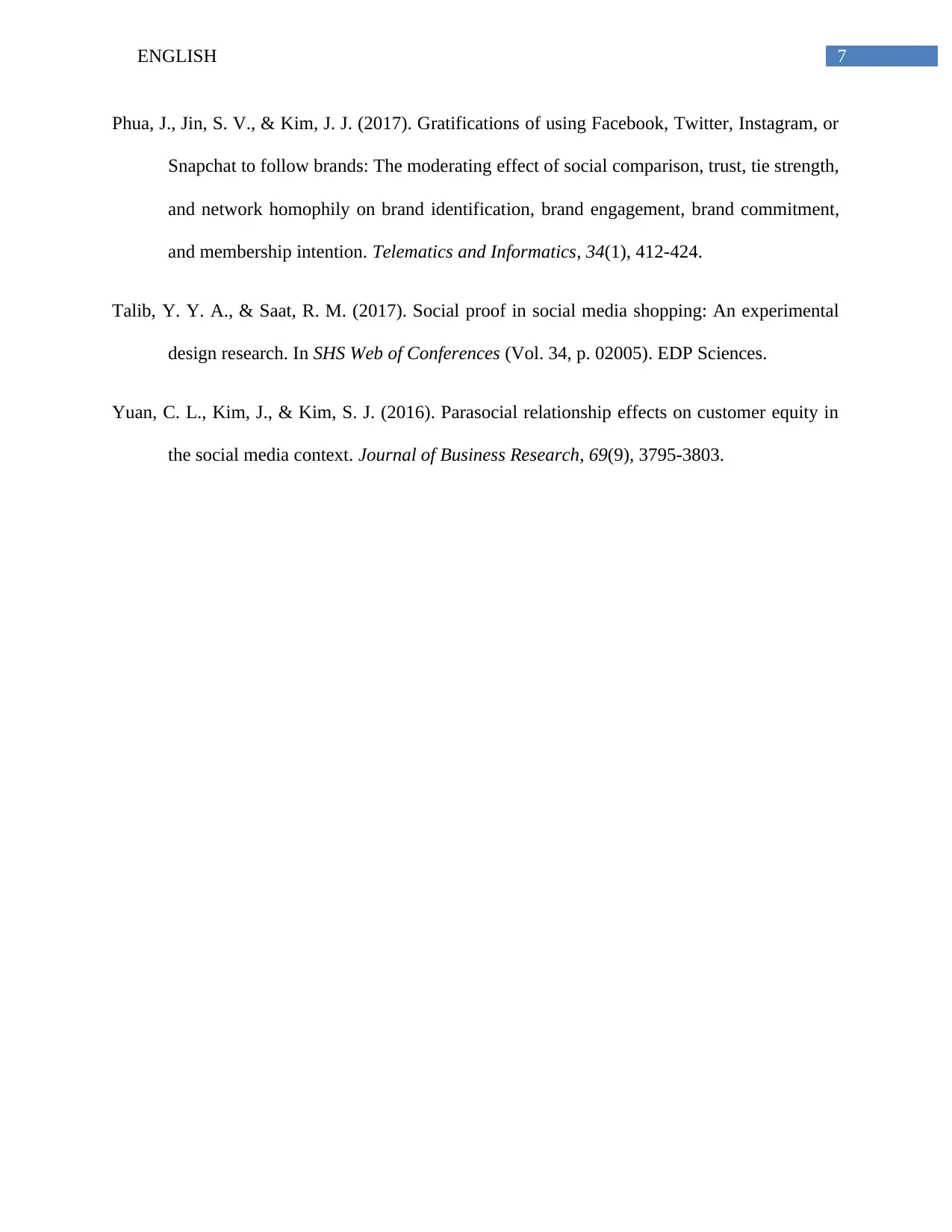
7ENGLISH
Phua, J., Jin, S. V., & Kim, J. J. (2017). Gratifications of using Facebook, Twitter, Instagram, or
Snapchat to follow brands: The moderating effect of social comparison, trust, tie strength,
and network homophily on brand identification, brand engagement, brand commitment,
and membership intention. Telematics and Informatics, 34(1), 412-424.
Talib, Y. Y. A., & Saat, R. M. (2017). Social proof in social media shopping: An experimental
design research. In SHS Web of Conferences (Vol. 34, p. 02005). EDP Sciences.
Yuan, C. L., Kim, J., & Kim, S. J. (2016). Parasocial relationship effects on customer equity in
the social media context. Journal of Business Research, 69(9), 3795-3803.
Phua, J., Jin, S. V., & Kim, J. J. (2017). Gratifications of using Facebook, Twitter, Instagram, or
Snapchat to follow brands: The moderating effect of social comparison, trust, tie strength,
and network homophily on brand identification, brand engagement, brand commitment,
and membership intention. Telematics and Informatics, 34(1), 412-424.
Talib, Y. Y. A., & Saat, R. M. (2017). Social proof in social media shopping: An experimental
design research. In SHS Web of Conferences (Vol. 34, p. 02005). EDP Sciences.
Yuan, C. L., Kim, J., & Kim, S. J. (2016). Parasocial relationship effects on customer equity in
the social media context. Journal of Business Research, 69(9), 3795-3803.
1 out of 8
Related Documents
Your All-in-One AI-Powered Toolkit for Academic Success.
+13062052269
info@desklib.com
Available 24*7 on WhatsApp / Email
![[object Object]](/_next/static/media/star-bottom.7253800d.svg)
Unlock your academic potential
Copyright © 2020–2026 A2Z Services. All Rights Reserved. Developed and managed by ZUCOL.





